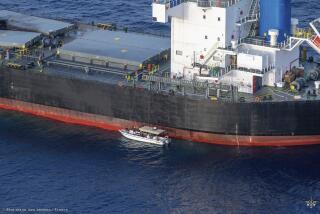Iran Reportedly Allows Iraqi Oil in Its Sea Lanes
- Share via
TEHRAN — In an unexpected reversal, Iran has opened its protected sea lanes to dozens of ships carrying illegal shipments of Iraqi oil in violation of U.N. sanctions on Saddam Hussein’s government, U.S. officials said Monday.
The Clinton administration considers the about-face alarming because oil smuggling is Hussein’s only major source of independent income. U.S. officials have estimated that unfettered access to Iranian waters could generate as much as $1 billion for his regime this year.
For about two months, Iran had refused to allow ships carrying contraband Iraqi oil to sail along its coastline beyond the reach of U.N. and U.S. ships deployed to enforce the embargo. But Thursday, a wave of oil-laden ships moved into Iranian waters in what one senior U.S. official likened to “a jailbreak.”
“There was a huge backlog of ships full of smuggled oil that couldn’t move into the [Persian] Gulf because Iran had kept them bottled up,” said the official, who declined to be identified. “Then, suddenly, on Thursday they all set sail.”
U.S. officials said they are mystified by Iran’s apparent policy shift, noting that Tehran had been widely lauded for the spirit of cooperation it displayed over the previous two months.
Besides the obvious boost to Iraq’s finances, the administration is concerned about the diplomatic implications of Iran’s turnabout.
Iran’s clampdown on Iraqi oil shipments coincided with a U.S. overture lifting sanctions on exports of Iranian carpets, pistachios and caviar. Washington had hoped that Tehran’s move to curtail smuggling was a reciprocal gesture signaling interest in warmer relations after two decades of open hostility.
After the ships were detected in Iran’s sea lanes Thursday, the United States and other countries made urgent appeals to Tehran through diplomatic channels to stop the traffic. Those requests were confirmed Monday by Iran’s Foreign Ministry.
“They informed us that one or two ships had been seized, and asked us to seize the rest. We passed the information immediately to our military authorities, as it is our policy to seize all vessels carrying Iraqi oil,” Iranian Deputy Foreign Minister Mohammed Javad Zarif told The Times.
Zarif said about two dozen ships were involved. American officials, however, said the figure is considerably higher.
The problem for Iran involves logistics, not political will, said Zarif, citing the more than 600 miles of Iranian coastline along the gulf.
“We told the United Nations that we would respond to the best of our ability but that we also need international assistance,” Zarif said. “This is a costly and difficult exercise considering the vast area involved.”
According to U.S. officials, the illegal oil shipments are now passing through Iranian waters with no apparent impediments.
The oil-laden ships have sailed under a number of flags, including those of Russia, Honduras, Belize, Panama and some Mideast countries. As long as they remain within 12 miles of Iran’s coastline, they are outside the jurisdiction of U.N. and U.S. ships enforcing the embargo.
It is easier for ships to evade U.S. and U.N. monitors once they get farther down the gulf.
Under U.N. sanctions, Iraq is allowed to export as much crude oil as it can produce, but only under the auspices of a U.N.-monitored “oil-for-food” program. Funds generated by the approved shipments are distributed by the United Nations to purchase humanitarian supplies for Iraqi citizens.
But Hussein’s government has generated a separate stream of illicit income for itself by selling smuggled oil and refined petroleum products to foreign buyers. U.S. officials said such sales have been his only significant source of funds to spend on weapons programs, luxury goods or other non-humanitarian purchases.
To avoid the U.N. blockade, sanctions-busting ships have loaded contraband oil in the Iraqi port of Abu Flus, then sailed through the narrow Shatt al Arab waterway to the gulf, according to U.S. officials.
Before entering the gulf, the ships passed through a checkpoint run by Iran’s Revolutionary Guards, who charged a fee based on the quantity of oil the ships were carrying, U.S. officials contend. That practice was halted two months ago when Iran decided to shut down the coastal smuggling route, but it appears to have resumed, U.S. officials said.
U.S. officials have said they are not certain whether the smuggling has been condoned by officials in Tehran, or whether it has been a rogue operation. It is unclear whether the Revolutionary Guards are within the full control of President Mohammad Khatami, who, under Iran’s Islamic government, is not commander in chief.
More to Read
Sign up for Essential California
The most important California stories and recommendations in your inbox every morning.
You may occasionally receive promotional content from the Los Angeles Times.













